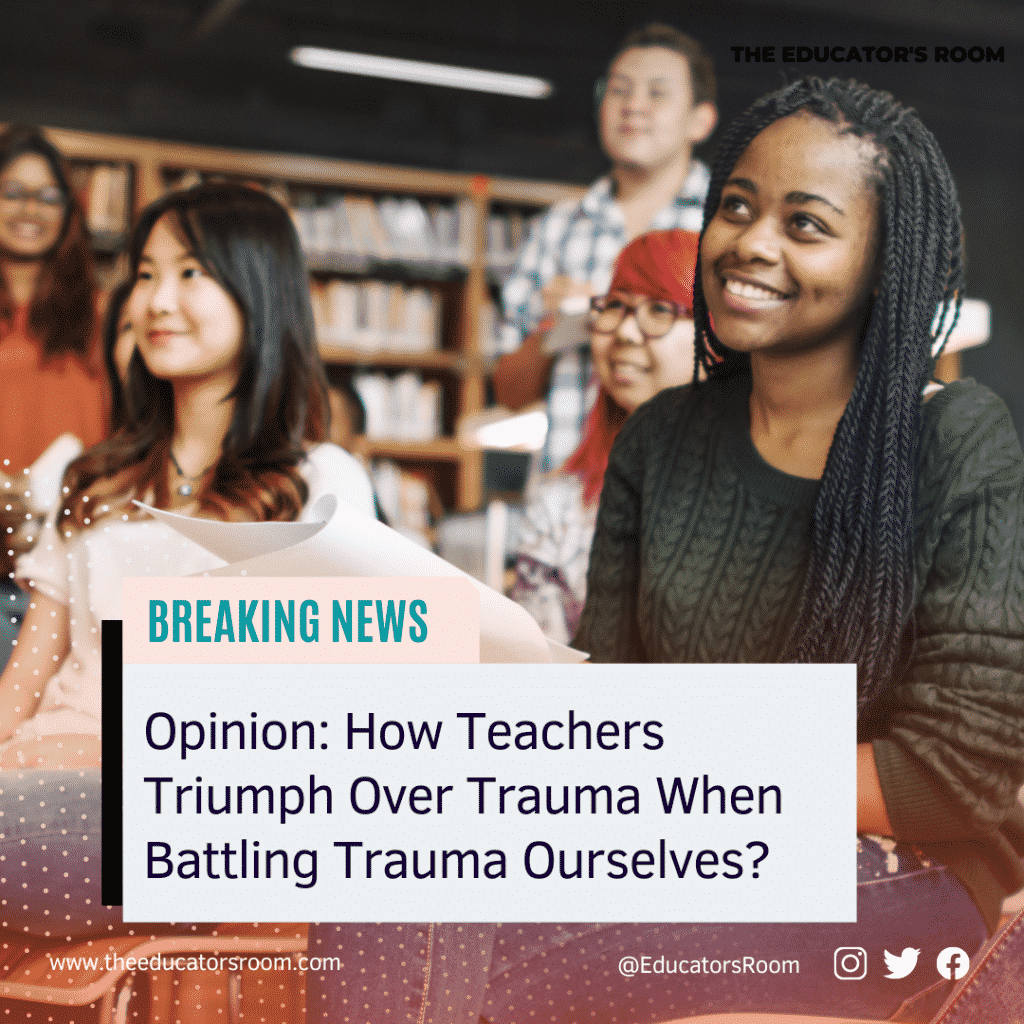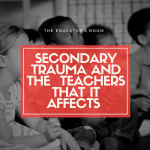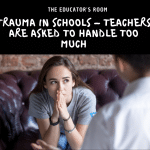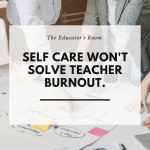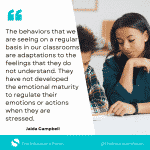“Can I talk to you?” As educators, we are taught to prioritize being the ones to provide others with a safe space, trusted adult, and potentially be that one voice who can talk someone off a literal edge of a breakdown. But what happens when we need the same for ourselves?
As a colleague, we may be the only ones that others feel comfortable going to for advice, guidance, or just to vent. And yet, from whom do we get these necessary outlets? As humans navigating this crazy thing we call life, we all need someone who will listen. However, we cannot afford to lose ourselves in our endeavor to help others.
We have to examine our own ability to continually triumph over trauma when in fact we are battling trauma ourselves.
As veteran teachers, we are often the ones colleagues feel might have insight when negative situations arise. The truth is, we may ourselves have long-lasting effects of wounds from situations that might have been treated as “not a big deal,” incidents that were “swept under the rug,” or even experiences that never had the follow-up and/or accountability many trauma-inducing harms warranted. Many “isms” have caused harm to many, and colleagues want to know how we dealt with and inevitably overcame them.
Ageism (being only twenty-six when I started), sexism (being a woman), racism (being a Black educator), and tokenism (being the “face” of so much for so many), are experiences that I have been able to share with younger teachers. These days, the more I share, the more I realize that I have never truly healed myself from some traumas. We in no way want to make others feel like they cannot come to us as “the go-to” for all things therapeutic. The teacher’s teacher, the counselor, the mentor, the silent ear to listen…it is a blessing, and you wear these titles with pride. But what happens when you need these services for yourself?
So how can we continue to triumph over trauma when in fact we have yet to heal from trauma ourselves?
Courage in the face of adversity is much more difficult when you are unfortunately triggered by the adversity of others. I have heard racial slurs being targeted at our Black Indigenous People of Color (BIPOC) staff and remember the same feelings of being shocked, violated, and traumatized all too well. I have heard about teachers wondering how to deal with both subliminal and blatant racism by students towards other students. I remember the feeling of helplessness when one tried to keep students from being harmed, only to have a lack of accountability or “who you know” be the determining factor in consequences. I have heard about “not having enough concrete, irrefutable evidence” to prove guilt in hate crimes involving nooses and swastikas, as well as not being able to prove “intent” with the same symbols.
“When adversity strikes, that’s when you have to be the most calm. Take a step back, stay strong, stay grounded and press on.” —LL Cool J
Calm, cool, and collected is often much easier said than done, especially when it comes to protecting one’s peace. The guilt is often self-imposed when thinking about how we can protect ourselves from harm. We need to learn how to navigate these waters of embodying the archetypal empath who takes on the pain of others at their own expense.
I am learning that through my own journey to triumph over trauma, I have many issues I still need to work out within myself. I can listen to the trauma of another and feel myself just as concerned and sympathetic as I have always been, but I have also learned to be continually mindful not to unconsciously compare traumas. While I experienced similar and sometimes worse things, comparing trauma is never a healthy response to someone else who is living their trauma in the here and now. Would I voice any of this aloud as I am striving to be “there” as I have always been for others? Of course not, but the internal dialogue that I have been experiencing as of late is teaching me that some traumas that others are experiencing are eerily familiar and triggering to me.
So how do we continue to protect our own mental health? Mental health has become a two-way street for those of us who value being “there” for others as well as ourselves. As educators, we must know when to step back from any and all situations, but how do we do that without feeling the guilt of not being “there” for someone who needs you more than you may even realize?
“Every one of us needs to show how much we care for each other and, in the process, care for ourselves.”— Princess Diana
I am learning to pay much more attention to my own bandwidth when it comes to dealing with and healing from my own trauma. There are times when the “go-to” needs truly unplug and be honest with people. Is there a way to ever truly unplug and protect our own mental health without feeling like we are abandoning someone else?
Absolutely! And there is no need to feel guilty about it!
Who cannot take their own advice? Who can be “there” for others if you are not “there” for yourself? Who can pour from an empty well? My advice to those who also hold these titles in education, at your school sites, in your family, or any other aspect of life, is to take time for yourself! If the trauma is too close and happens to be trauma-inducing-disengage! You cannot continue to sustain the responsibility of being “there” for others if you are not “there” for yourself first. You cannot show someone else how to triumph over trauma unless you have done the same for yourself. Listen and be “there” for the person, but also be honest and transparent if you are not able to be completely “there” in the way they need you to be at that time. Give yourself time to reflect and decide if you will be able to revisit the situation in the future, or if you need to totally remove yourself from that experience altogether.
Ultimately, empathy does not mean you have to deny your own feelings. Being “there” for someone else does not mean you cannot make sure to be “there” for yourself. Putting yourself in the other person’s shoes does not mean that you always have to take off your own.
